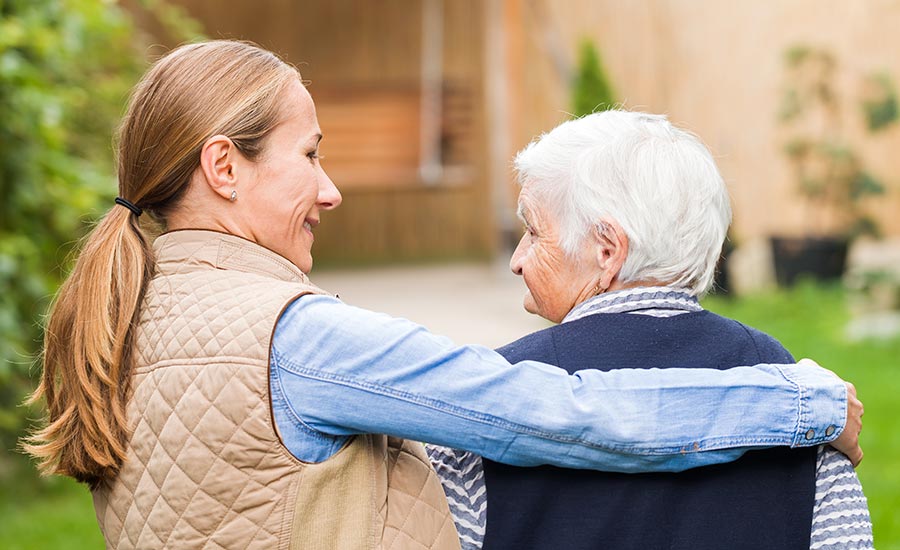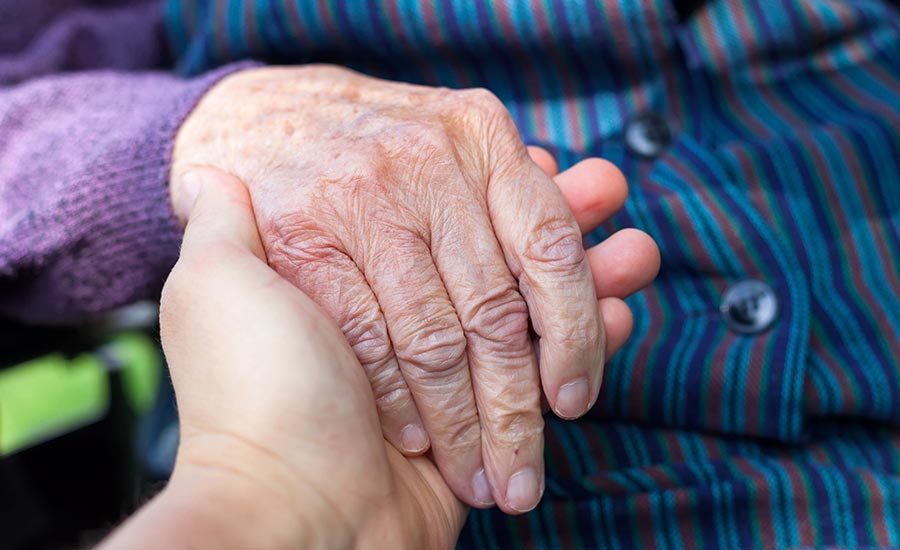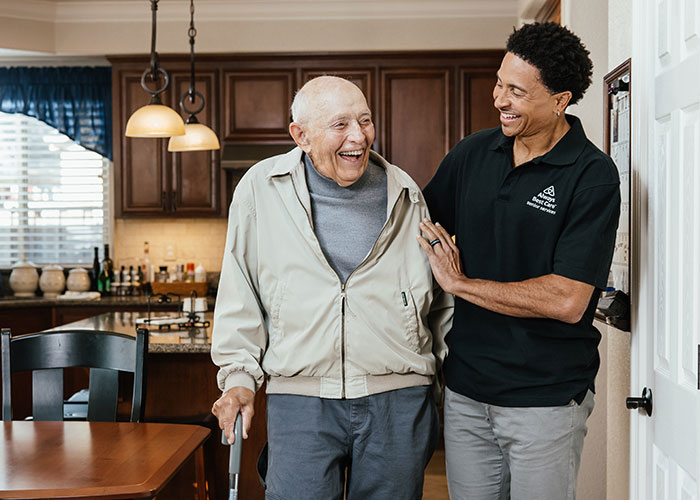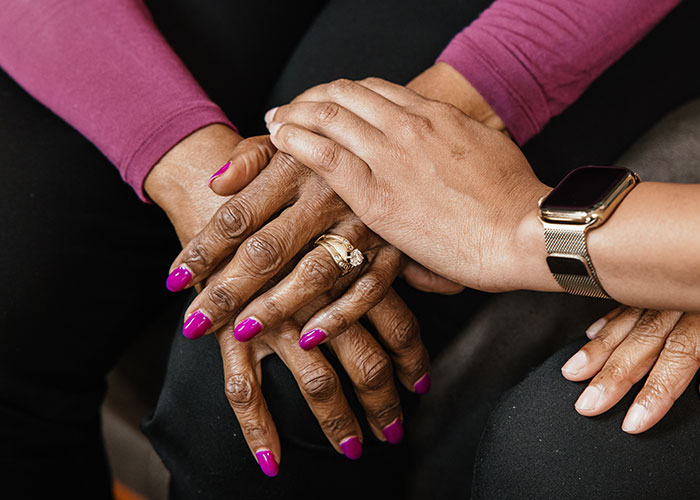Late-Stage Dementia Symptoms + Caregiving Tips & FAQs

Late-stage dementia is the seventh and final stage of dementia — a condition that causes the decline of cognitive functions, such as memory, language, and attention.
This final stage of dementia is characterized by severe cognitive decline, increased dependency on caregivers, and significant challenges in daily functioning and communication.
We’ll walk you through the different symptoms of late-stage dementia and provide tips on how to care for your loved one during this challenging time. We’ll also share how our compassionate team at Always Best Care Senior Services can help.
Table of Contents
What Is Late-Stage Dementia?
Late-stage dementia, or end-stage dementia, is the final stage of the condition.
In the last stage of dementia, symptoms become more severe, making individuals more dependent on caregivers for their daily needs.
What Are the Symptoms of Late-Stage Dementia?
As dementia progresses, individuals will eventually need constant care, including help with eating, bathing, and dressing.
Signs of late-stage dementia include:
1. Muscle Atrophy
Muscle atrophy is the decrease of muscle mass, often resulting from lack of physical activity, aging, and certain medical conditions, including dementia.
In end-stage dementia, muscle atrophy becomes more evident, leading to decreased mobility. It can also contribute to challenges with balance, making dementia patients more prone to falls.
2. Incontinence
Incontinence is characterized by the involuntary loss of bladder or bowel control.
In end-stage dementia, individuals may have incontinence due to a decline in cognitive function, making it difficult for them to recognize the need to go to the bathroom.
3. Limited Speech
Limited speech is characterized by the reduced lack of ability to find the right words or form sentences.
In end-stage dementia, individuals rely on gestures or facial expressions to communicate. This often requires caregivers to develop alternative methods of understanding and addressing their needs, such as observing non-verbal cues or engaging in touch or handholding for comfort.
4. Changes in Mood and Behavior
Late-stage dementia behavior changes include finding the world more confusing. Physical discomfort, changes in surroundings, or other health problems can also intensify these changes in behavior.
In end-stage dementia, common behavior changes include delusions and hallucinations, in which the individual sees or hears things that aren’t real. These experiences can be distressing, leading to fear, agitation, or even aggression.
5. Eating Less
Eating less is characterized by a reduced appetite and food intake.
In end-stage dementia, individuals eat less due to difficulty swallowing or changes in taste or sensory perceptions. This decreased consumption can further impact their overall health, leading to malnutrition.
6. Decrease in Motor Skills
A decrease in motor skills is characterized by reduced coordination and balance.
In end-stage dementia, individuals often experience a significant decline in motor skills, making tasks such as walking, holding objects, and even sitting up challenging.

What Is the Life Expectancy of Late-Stage Dementia?
Typically, the final stage of dementia lasts around one to two years.
However, the life expectancy of individuals with late-stage dementia also depends on several factors, including age, type of dementia, and overall health.
How To Care for a Loved One With Late-Stage Dementia
Dementia patients experience changes in how they understand the world around them, in a way that affects their daily life and activities.
As the condition progresses, caring for a loved one with dementia requires patience, understanding, and adaptability.
As a caregiver, here’s how you can help:
- Create a safe environment: Utilize bed rails to prevent your loved one from falling and remove trip hazards like loose rugs and cluttered walkways throughout their living environment.
- Lock doors: Install locks or door alarms to prevent your loved one from wandering.
- Assist your loved one with their daily needs: Help your loved one with their daily activities, such as bathing, dressing, feeding, and toileting.
- Establish a routine: Create a daily routine to help reduce confusion and anxiety in dementia patients. A routine provides a sense of familiarity and security.
- Consider preparing a soft diet: Provide your loved one with foods that are easy to digest, such as mashed potatoes, apple sauce, and pasta, as swallowing can become difficult in late-stage dementia. Look out for signs of choking and make sure your loved one is sitting upright during meals.
- Encourage self-feeding: Place food on a spoon and guide your loved one’s hand to their mouth, if needed. Offer finger foods if your loved one finds it difficult to use utensils.
- Limit liquids before bedtime: Make sure your loved one stays hydrated throughout the day, but limit drinks to about two hours before bedtime to reduce nighttime accidents.
- Monitor your loved one’s weight: While weight loss is a common sign of end-stage dementia, it can indicate poor nutrition, illness, or side effects of medication. Consult with your loved one’s physician if you notice significant weight loss.
- Use simple and straightforward words: When communicating with your loved one, speak slowly, and use simple phrases. This makes it easier for them to understand and process the information, reducing confusion and frustration.
- Utilize non-verbal cues: Use non-verbal cues, such as hand gestures, facial expressions, and body language, when talking to your loved one. Be patient while giving them time to process and respond. This can help provide assurance in situations where verbal communication may be limited or unclear.
- Implement brain stimulating activities: Engage your loved one in puzzles and board games, art projects, and music. These recreational activities can help slow down cognitive decline and improve mental engagement.
- Motivate your loved one to write: Encourage your loved one to write down appointments, to-do lists, and events in a notebook or calendar, to help organize thoughts, reinforce memory, and provide a sense of control and routine in their daily life.
- Manage behavior changes: Look for agitation or anxiety triggers and eliminate them from your loved one’s environment. For example, if you notice that your loved one gets anxious during bath time, consider playing soothing music or using scented candles when it’s time to bathe.
- Provide personal hygiene care: Regularly change adult diapers and use protective bedding. Clean your loved one’s skin immediately with mild soap after soiling incidents to prevent rashes and infections.
- Make sure your loved one wears loose-fitting clothes: Encourage your loved one to wear comfortable clothes that are easy to put on and remove, like pants with elastic waistbands, to facilitate faster trips to the bathroom.
- Use assistive devices: Use a sturdy shower chair to prevent your loved one from falling during bath time, or grab bars in the bathroom to provide support while they are standing or moving.
- Monitor your loved one’s physical health: Watch out for skin issues like bed sores (especially for bedridden patients) and signs of infections, such as psoriasis, urinary tract infections, and pneumonia.
- Prioritize comfort: Use pillows to support your loved one’s position and reduce pressure points, making sure they are as comfortable as possible. Perform gentle massages or apply lotion to keep their skin moisturized and promote relaxation.
- Prevent joint locking: Being confined in a chair or bed for an extended period of time can cause joints to stiffen. Consult with your loved one’s physician to determine whether you can perform gentle exercises on your loved one, such as moving their arms and legs daily after bath time.
- Seek support: Connect with dementia caregiver support groups or join online forums to share experiences and get advice from others who understand your caregiving journey. Interacting with others can ease feelings of isolation and burnout, helping you provide better care for your loved one.
- Offer reassurance: Comfort your loved one during confusing or distressing times. Even a gentle touch, holding hands or sharing a fun memory can help provide reassurance.
- Research dementia: Consult with your loved one’s healthcare provider to learn about the stages and symptoms of dementia. Stay updated about recent research and treatments to provide the best care possible for your loved one.
- Celebrate small wins: Whether it’s sharing a smile or recalling a name or milestone event, acknowledging small wins can help boost positivity and connection for both you and your loved one.

Late-Stage Dementia Care at Always Best Care
Our services span across 225 territories, allowing our caring team to provide top-quality support for patients across the United States and Canada.
Our care services include:
Our in-home care services include:
- Respite care: We provide temporary, high-quality care for your loved one, allowing you to manage other responsibilities or simply take a much-needed break.
- In-home care services: Our team offers 24/7 care, including meal preparation, companionship, toileting, and hospice or end-of-life support services, in the familiar setting of your loved one’s home.
- Skilled home health care: Available in select locations, we manage long-term illnesses and tailor home care plans for your loved one’s specific needs.
- Specialized home care: We use advanced technology, like balance tracking and remote patient monitoring to closely monitor your loved one within the scope of our specialized home care services.
- Senior living referral services: We help guide you to the best senior living options, including those with emergency and medical services.
- Veterans assistance program: We help veterans obtain financial aid for care, ensuring they receive the respect they’ve earned.
FAQs About Late-Stage Dementia
Still have questions about dementia that we didn’t address? Discover answers below.
How long does late-stage dementia last?
Late-stage dementia usually lasts around one to two years. However, the duration can vary due to several factors, including overall health, age, and type of dementia.
What are the eating challenges of late-stage dementia?
The eating challenges of late-stage dementia include the inability to use utensils or swallow foods that are chewy or tough.
For example, late-stage dementia patients may cough or choke while eating or drinking, increasing the risk of aspiration — in which food enters the lungs instead of the stomach — leading to pneumonia or chronic lung scarring.
Are late-stage dementia patients aware of their condition?
No, late-stage dementia patients are not aware of their condition. Memory loss and cognitive decline are key symptoms of dementia, making it difficult for late-stage dementia patients to recognize or understand their condition.
Can late-stage dementia be cured?
While there is no cure for late-stage dementia, symptoms can be managed by keeping the patient comfortable and providing care for pain relief, emotional support, and personalized interventions.
When should I consider hospice care?
Hospice should be a consideration when your loved one’s condition progresses to a point where treatments are no longer effective — for example, during end-stage dementia. Hospice care focuses on pain management, emotional support, and spiritual guidance.





